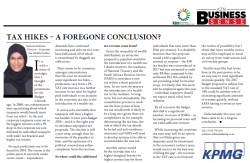Yasmeen Suliman : KPMG Durban - Tax Hikes - A Foregone Conclusion?2018-02-25 It is with a sense of nostalgia that I thought of the predictions for the Budget a decade ago. In 2008, tax commentators were speculating about which taxpayers would benefit most from tax relief â€" in the end corporate taxpayers came out as the biggest winners with a 1% drop in the corporate tax rate followed by individual taxpayers with wider tax brackets and higher tax rebates.
No such predictions are to be found for 2018. The reason is the public purse is currently under severe strain â€" expenditure demands have continued increasing and debt service costs have ballooned, all of which is exacerbated by sluggish tax collections. There seems to be consensus amongst commentators that this year we would see some significant tax hikes â€" predictions vary from a 2% VAT rate increase to a further increase in tax rates for higher paid individuals to an increase in the corporate tax rate to the introduction of a wealth tax. It seems to be inevitable that taxpayers will have a higher tax burden to bear post-Budget 2018 â€" and it is the right year to introduce unpopular tax proposals. The election is still a year away, enough time for memories of the populace to fade, and the optimism of a political renewal may soften complaints from the tax base. So where could the additional tax revenue come from? Given the inequality of wealth distribution, an attractive proposal to populists would be the introduction of a wealth tax. I doubt, however, the readiness of National Treasury and the South African Revenue Service (SARS) to introduce a new tax within a short period of time. In my view, we may see the introduction of a wealth tax in the medium- to longterm, but not immediately. The consultation process to work out the finer points of how the tax would work is likely to be a long one (given there are complexities in, for example, determining the tax base, the rate at which the tax should be levied and anti-avoidance measures) and SARS will need to develop systems to be able to accommodate the new tax. Another option would be the introduction of a higher marginal bracket for higher earners (say for those individuals that earn more than R3m per annum). It is doubtful, however, that this proposal would yield a significant amount in revenue â€" the 45% tax bracket was reintroduced in 2017 but was estimated to yield only R4,4bn, compared to the estimated R12.1bn yielded by not providing relief for bracket creep. It is likely that this tactic will be employed again this year â€" individual taxpayers should not expect much relief from inflation. By all accounts the budget shortfall is a significant number, in excess of R50bn â€" so focussing on personal taxes will not yield sufficient revenue. While increasing the corporate tax rates may well be an option (but not likely given our desperate need for investment in the economy), indirect taxes would seem to be the best way of filling the gap â€" the increase in the VAT rate is not beyond the realms of possibility, but I think that more stealthy tactics may well be employed to avoid an outcry from trade unions and civil society groups. Stealth taxes like fuel levies have in the past proven to be an easy way to raise significant revenues quickly. The 2017 Budget proposal to subject fuel to the standard VAT rate of 14% could be another way of increasing significant amounts of revenue quickly, without SARS having to invest in new systems. Unfortunately this year, tax hikes seem to be a forgone conclusion. Tel: +27 82 778 1031 yasmeen.suliman@kpmg.co.za |
Yasmeen Suliman : KPMG Durban - Tax Hikes - A Foregone Conclusion?
Copyright © 2024 KwaZulu-Natal Top Business
